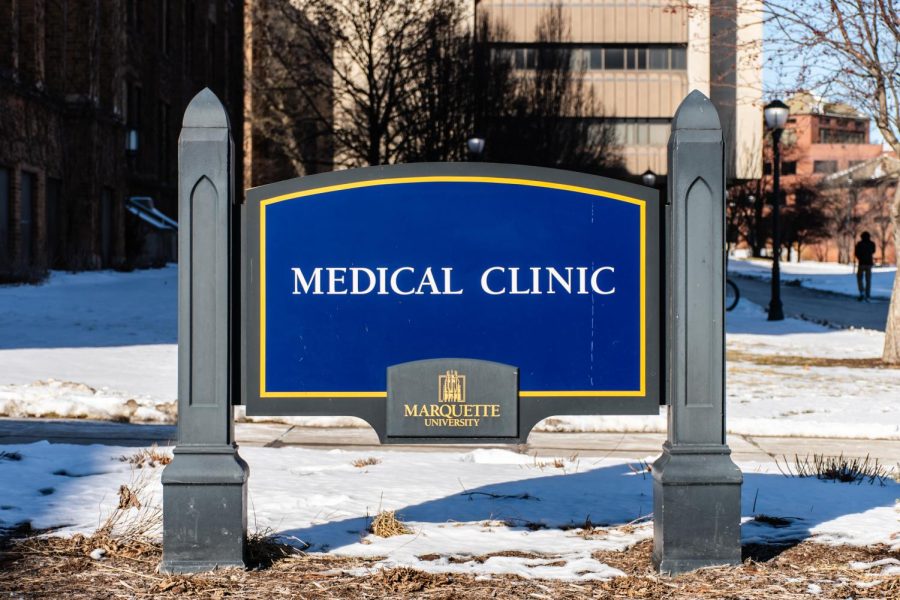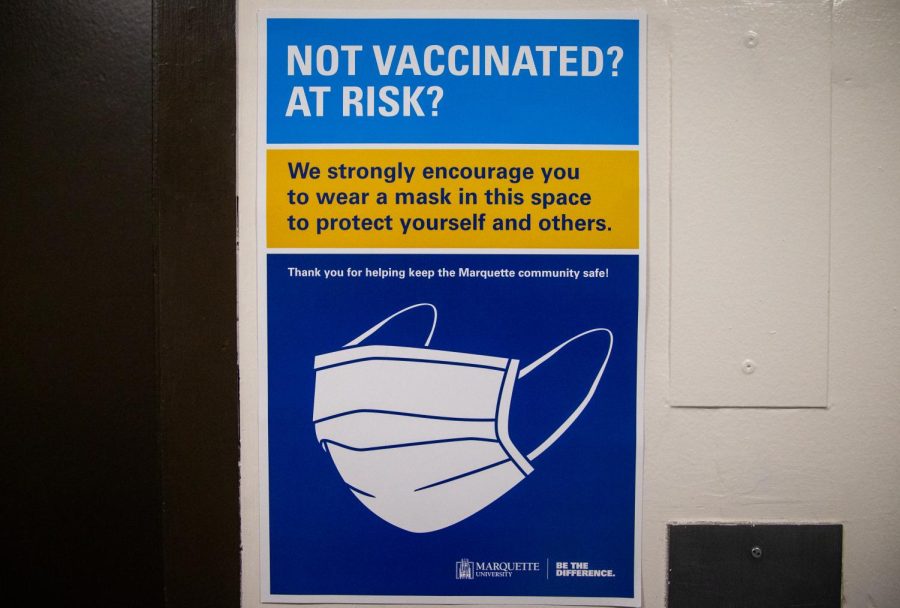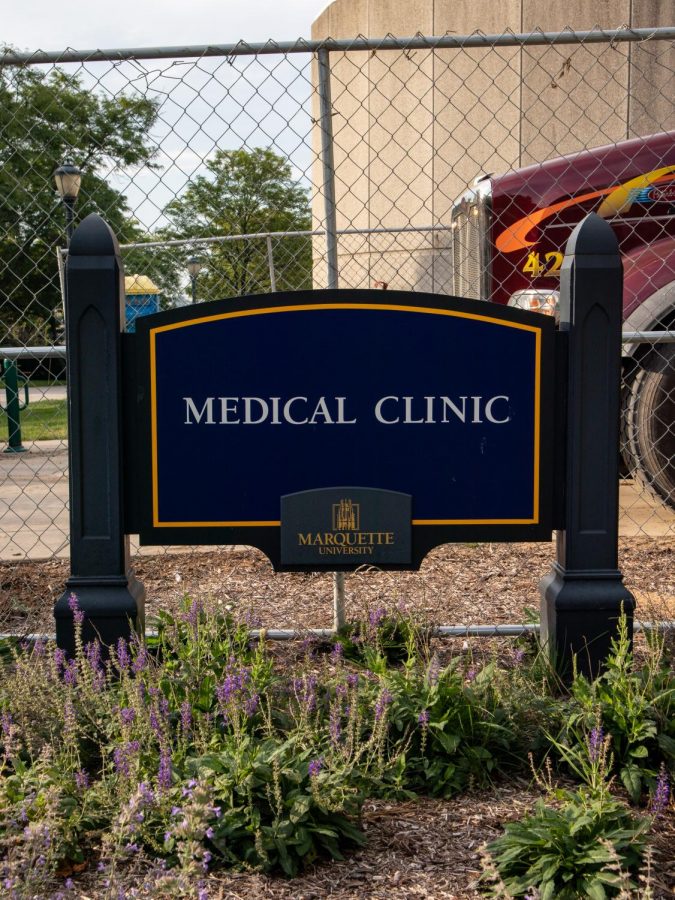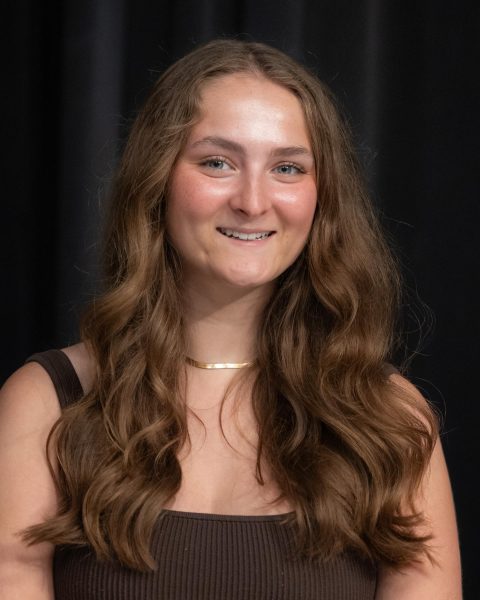As the spring semester begins, and the COVID-19 omicron variant continues to be a major health concern, Marquette University adopts new COVID-19 testing strategies on campus.
“Unvaccinated students are now tested weekly, as more frequent testing identifies cases quicker, which allows quicker isolation and contact tracing to decrease transmission,” Keli Wollmer, executive director of the Marquette Medical Clinic, said in an email.
Marquette required students to upload proof the COVID-19 booster vaccine and strongly encouraged faculty to receive it by Feb. 1. Those who do not upload proof of receiving the booster are subject to weekly surveillance testing.
“If eligible and booster is not received, then individuals are subjected to testing protocols and must quarantine if exposed,” Wollmer said in an email. “Details of this testing have not yet been announced but will be in the near future.”
A walk-in vaccination, booster and flu clinic will be held on Marquette’s campus Feb. 1 for all students, faculty and staff to receive vaccines. The clinic will be held from 10 a.m. to 2 p.m. in the Alumni Memorial Union Ballrooms. Although individuals do not need an appointment for the clinic, one may pre-register online if desired.
Marquette Today released Jan. 18 that all COVID-19 doses of Moderna, Pfizer and Johnson & Johnson will be available, which will include first, second and booster vaccines.
Individuals are only required to bring their Centers for Disease Control and Prevention COVID-19 vaccination card if they have their first dose already.
Last semester unvaccinated students were required to be tested for COVID-19 every other week, and this semester those who do not upload proof of COVID-19 vaccinations or the booster will now undergo weekly COVID-19 testing.
Currently, Wollmer said only symptomatic students, faculty and/or staff or those who have been in close contact/identified as a close contact from a positive individual can be tested for COVID-19 at Coughlin Hall.
Those who are asymptomatic or curious would have to go to an off-campus location, the City of Milwaukee has several locations for those to receive a free polymerase chain reaction test.
A PCR test is used to “detect genetic material from a specific organism, such as a virus. The test detects the presence of a virus if you have the virus at the time of the test. The test could also detect fragments of the virus even after you are no longer infected,” the Cleveland Clinic said on its website.
Wollmer also said the federal government purchased 500 million rapid COVID-19 tests, and individuals are able to order them online.
“All individuals on Marquette’s medical plans can purchase over-the-counter COVID-19 tests authorized by the U.S. Food and Drug Administration that will be covered at a reimbursement rate of up to $12 per test,” Wollmer said in an email.
Philip Rocco, associate professor in the political science department, said he believes Marquette is going in the right direction in regards to providing information about covered benefits for those who are covered by the medical plan.
“However, students are not on Marquette medical plans,” Rocco said. “The expectation is that you’re either going to be on your parent’s insurance or have insurance through some other source.”
Allison Abbott, associate professor in the Department of Biological Sciences and chair of the University Academic Senate said in a perfect world, every student at Marquette would be able to receive even 10 rapid tests a month from the university.
“I don’t think that’s Marquette failing not to be able to get those tests. That’s a bigger problem than Marquette, so I would love it if … we are all able to sort of have access to those tests whenever you know we wanted one, I think that would help us,” Abbott said. “But I also recognize that’s not where we are in our country’s supply of rapid tests.”
Abbott said that as a country, utilizing rapid testing as a tool not only for individual diagnostics but also for public health is an area where is an area we could do better in.
Rocco said that because the federal government is requiring insurance companies to cover the rapid tests, he said the expectation is that students would be able to access those tests through their own insurance.
“I think this is one of the problems with the federal government’s strategy. Which is providing four tests per household is a great start, but realistically— especially depending what plan you have, there are different kinds of barriers to purchasing those tests,” Rocco said.
Zoe Hammer, a sophomore in the College of Nursing, said she believes Marquette should be supplying some amount of free and accessible tests for every student.
“When students need testing, it should be easy for students to receive a test in the easiest way possible,” Hammer said in an email.
Because Marquette’s campus is 94% vaccinated, Abbott said Marquette will not only be mostly vaccinated, but mostly boosted as well— which she said puts the university in a better position than it was a year ago when vaccinations were not available, so she said becoming infected with COVID-19 may not be associated with that same level of danger as it was last year.
“But that’s not true for everyone, right? … Our president is undergoing treatment for cancer, so we need to protect him. [We need] to protect, you know a lot of people on our campus that are more vulnerable,” Abbott said. “It’s sort of making sure we’re doing everything we can to keep each other safe, but also kind of recognizing that we are in a very different place than we were a year ago.”
This story was written by Julia Abuzzahab. She can be reached at julianna.abuzzahab@marquette.edu





